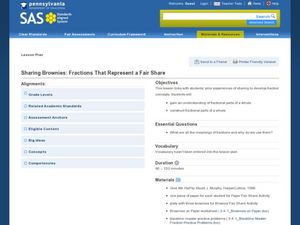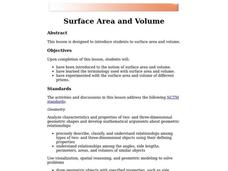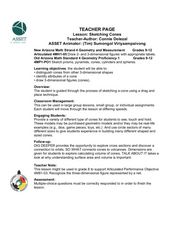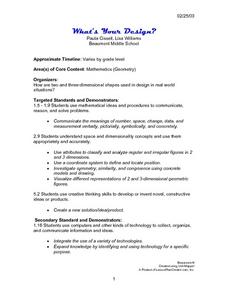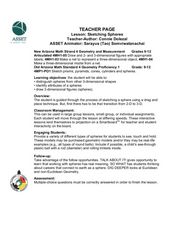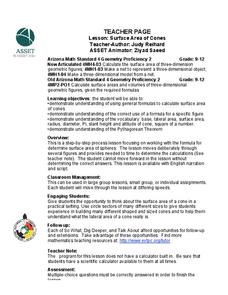Curated OER
Incredible Edible Bridges
Pupils create a bridge using engineering and geometric concepts. In this geometry lesson, students identify the missing measures of polygons sides and angles. They work together to solve real life situation using problem solving skills.
Curated OER
Let's Tesselate
Students investigate the geometrical concepts of translation, reflection, and rotation. They make different observations looking for the concepts that are displayed in classroom items like floor tiles, carpet designs, and visuals hung in...
Curated OER
Technology Integrated Lesson
Students investigate symmetry in the real world. In this geometry lesson, students inter-relate math and technology. They create and name a variety of polygons.
Curated OER
Pyramids & Prisms: Guler's Formula
Sixth graders compare and contrast two-dimensional shapes to three-dimensional shapes. After watching a demonstration, they make their own shapes using nets printed on paper. To end the instructional activity, they use the shapes they...
Curated OER
Create A Map!
Students examine two- and three-dimensional shapes, and discuss map skills and attributes. They plan and create their own school campus maps using pre-cut building site shapes.
Curated OER
Bridge Design and Bridge Building
Seventh graders conduct an investigation into the design of bridges and their construction. Students design bridges and draw detailed plans. For assessment they construct a model of a bridge that is made entirely of toothpicks. Students...
Curated OER
Discovering Solids
Second graders engage in a lesson that is about the discovery of solids. They identify using shapes like cones, spheres, cylinders, and cubes in various different situations. Students explore the classroom in order to find examples of...
Curated OER
Visualizing Multiplication
Upper graders represent multiplication of a two-digit number by a two-digit number as the area of a rectangle with dimensions of the two factors. They find patterns for the number of different base ten blocks in a rectangle representing...
Curated OER
What Is Hyperbolic Geometry?
Ninth graders discuss the concept of hyperbolic geometry. They complete Internet geometry activities and write essays comparing and contrasting hyperbolic geometry to Euclidean geometry.
Curated OER
Sharing Brownies: Fractions That Represent a Fair Share
Elementary graders discover the concept of fractional pieces of a whole. They investigate the meanings of fractions in everyday life and why they are used. Pupils divide brownies amongst each other to demonstrate the use of fractions...
Ohio Department of Education
Number Subsets: Winning the Number Game - Grade Eight
Young leearners identify subsets of the real number system and play a number game to identify natural numbers, whole numbers, integers, rational and irrational numbers.
Curated OER
New Kids on the Block
Second graders identify and describe in their own language, the following 2-dimensional and 3-dimensional shapes: triangle, square, oblong (non-square rectangle), circle, oval, pentagon, hexagon, diamond, box, cylinder, and sphere. They...
Curated OER
Surface Area and Volume
Students are introduced to the notion of surface area and volume. Students review surface area and volume by finding the area of a two-dimensional shape. They practice using the computer to create different surface area shapes.
Curated OER
More Prisms/Nets
Students calculate the volume and surface are of three-dimensional shapes. In this geometry lesson plan, students use the nets to prove their calculations of shapes. They identify the different parts of a solid using the nets.
Curated OER
Parallel-o-Home
Students investigate the usage of parallel and perpendicular shapes in the real world. In this geometry lesson, students investigate shapes for properties that are related to the real world. They relate all the properties of shape tot he...
Curated OER
Sketching Pyramids
Students sketch and identify properties of pyramids. In this geometry lesson, students create nets to identify three dimensional shapes. They sketch cones, prisms and pyramids.
Curated OER
Does the Area of the Quadrilateral Change?
Seventh graders complete activities to further their understanding of area formulas. For this area lesson, 7th graders watch as the teacher uses Polystrips to model parallelograms. Students find the area of a rectangle and answer...
Curated OER
Proportional Similarities
Young scholars model the geometric relationship with graphing. In this geometry lesson, students differentiate between parallel, perpendicular, similar and congruent shapes. They use properties of polygons to differentiate their shapes...
Curated OER
Same Area and Perimeter
Students identify the shapes of different polygons. In this geometry lesson, students identify the same area and perimeter in shapes. They use the correct formula for the correct shape.
Curated OER
Sketching Cones
Students sketch cones and identify its properties. In this geometry lesson, students calculate the surface area and volume of each three dimensional shape. they define and sketch prisms, pyramids and cylinders.
Curated OER
What's Your Design?
Sixth grade students: design a stained glass window, submitting their initial plan detailing the measurements of all lines and angles. Seventh grade students: create a scale drawing of their own geometric family of four members.
Curated OER
Sketching Spheres
Students investigate spheres through sketches. In this geometry lesson, students sketch two and three dimensional shapes creating nets. They find and differentiate between the nets for prisms, pyramids, cones, cylinders and spheres.
Curated OER
Surface Area of Cones
Learners find the surface area of cones. In this geometry lesson plan, students calculate the dimensions of each three-dimensional shape and use the correct formula to solve the problem. They relate concepts of cones to the real world.
Curated OER
Sketching Cylinders
Learners create nets of cylinders. In this geometry lesson, students calculate the surface area of cylinders and other solids. They show their understanding of three-dimensional shapes by solving problems.











